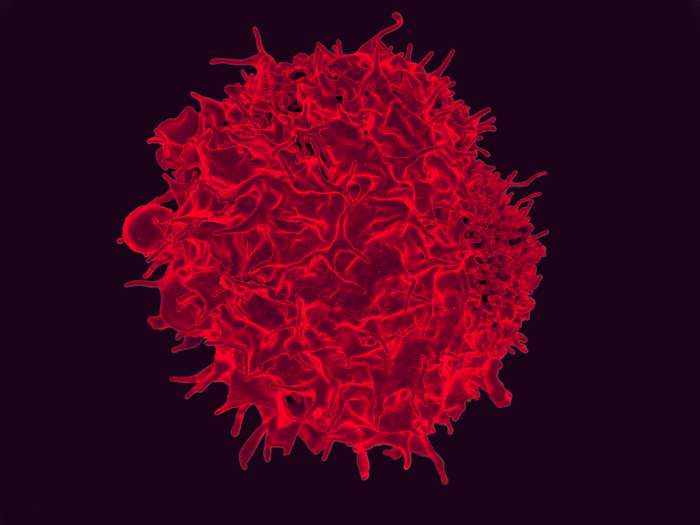
Colorized scanning electron micrograph of a T lymphocyte. (CREDIT: NIAID)
BETHESDA, Md. — An experimental cancer vaccine has successfully triggered significant tumor regression during lab tests on mice. The new drug offers hope that scientists are moving closer to an effective treatment for all forms of the disease, according to a team with the National Institutes of Health.
Researchers with the National Institute of Allergy and Infectious Diseases (NIAID) tested this vaccine, called SNAPvax, using two different delivery methods. Results show that intravenous (IV) administration of the vaccine boosted the number of cytotoxic T cells in each animal. These immune cells are able to break into and attack cancerous tumor cells as well as trigger the body's innate immune system by inducing type I interferon. These interferons are a protein animal cells release in response to viruses.
The study authors found that this innate immune response altered the tumor's “microenvironment” — preventing the cancerous cells from suppressing T cell action. The team notes, however, that mice receiving the vaccine through a needle injection in the skin (subcutaneous) did not see the same effect as those receiving it intravenously.
Scientists believe this breakthrough, nicknamed “vax-innate,” reaches an important milestone in immunotherapeutic vaccine research. Study authors add that the vaccine candidate may also help human patients who have previously received tumor-specific T cells during cancer treatments. Additionally, the vaccine may be able to improve the body's control of tumor growth by increasing T cell production and making them function better.
Dr. Robert Seder and his colleagues at the NIAID Vaccine Research Center designed SNAPvax with the help of Vaccitech North America, a clinical-stage biopharmaceutical company in Baltimore. Vaccitech is now planning to test SNAPvax against human papilloma virus-associated cancers in 2023.
The results are published in the journal Cell.










